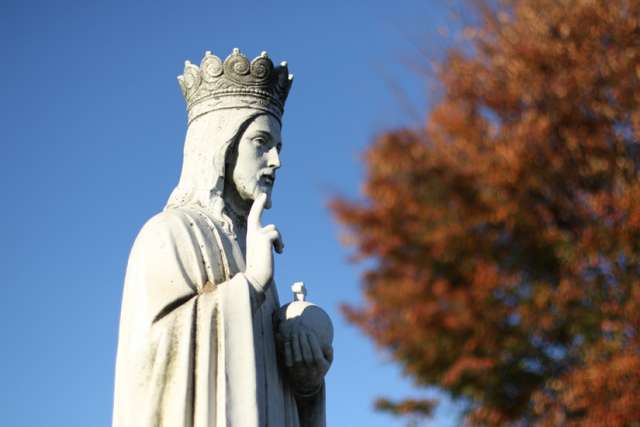Yet we are all so polarized. It seems that we cannot even speak to one another in a rational and civil manner. Attempts at solutions often fail because they are contaminated by human interests.
The situation was very similar in the second century B.C. when Daniel was written. It was written during the savagery and upheaval of the Jewish revolt against their Greek oppressors. The Greek king Antioches Epiphanes tried to destroy their culture, traditions and religion. He represented a model of kingly rule all too familiar to people in the ancient world (and the modern too!) — lust for wealth and power, unchecked by conscience or accountability. Many in Judea wondered if their nation and religion would survive.
Daniel’s vision gave reassurance. The majestic figure in the vision had the appearance of a human being (son of man) but that was where the resemblance ended. It was clear that he was a divine figure close to the Ancient of Days. All dominion, power, glory and kingship was given into his hands. He would exercise power over all humanity — all peoples, nations and languages. His power and kingship would be different, for it would be just and free from all corruption and self-interest. It would also be permanent — this would be a kingly rule that would never be overturned or die out. It was nothing less than the rule of the Earth by God.
We might ask when this will occur. From outward appearances, the world goes on just as before. But the vision was not a prediction of the future, but a visionary statement that God is in ultimate control of the world. We should not think that evil is triumphant or stronger than the light. Sometimes it might appear that way, but it is only temporary. We yearn for a time when God will take control, and this begins when we open our minds and hearts to God and allow God to work through us.
Revelation gives us another visionary proclamation. Christ is the Alpha and Omega, the beginning and the end. The rest of human history lies somewhere in between but belongs to God. The life, death and resurrection of Christ set us free from the past and empowered us with the authority of kings and priests but only when we walk in harmony with God. Christ is also the ruler of the kings of the Earth. No longer are they free to do as they please, because all must answer to Him. Power exercised with wisdom, justice and compassion glorifies God and continues the work of Christ. Power that is characterized by selfishness, cruelty, oppression and violence is an affront to God and serves only the dark forces in our world.
Jesus and Pilate both used the word “king” but each in a very different sense. Pilate felt threatened, for he had heard Jesus called a king and it meant only one thing to him: competition. As a Roman governor, he was well-versed in power politics, judicial violence and economic extortion. Kingship to Pilate meant control and organized oppression. Jesus insisted that His own kingdom was not of this world. He did not mean that it was otherworldly in the sense of being located somewhere else, like in the heavens. Instead, it signified that the ruling power He exercised derived from a different source — God — and He conducted Himself according to God’s ways. If His kingly rule were of the normal human sort, He and His followers would have employed violence to protect their freedom. The mission of Jesus was to testify to the truth, and the truth that He revealed in Himself was the nature of God — light and love.
The witness of Jesus shows us the nature of true power and how it should always be exercised. In a world prone to violence and injustice, believers can make a significant and lasting change by using “God power” to move hearts and minds rather than the familiar and discredited human methods.


